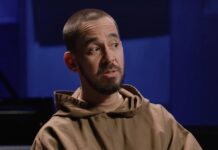Today is the 25th anniversary of Nirvana frontman Kurt Cobain’s suicide on April 5, 1994. Tragically, late Soundgarden frontman Chris Cornell took his own life 23 years later on May 18, 2017. You can call the National Suicide Prevention Lifeline at 1-800-273-8255.
While admittedly not being close friends with Cobain, in 1994 Cornell was hit hard by his death, especially as a fellow voice of the Seattle Grunge music scene. Soundgarden were told about Cobain’s death following an April 1994 concert. The band digested the news for 30 minutes in their dressing room with Tad. Ben Shepherd was the first to leave the room. He was emotional, with red eyes, as he had been the closest to Nirvana and Cobain.
“I don’t think anyone can safely resolve that’s why Kurt Cobain killed himself,” Chris Cornell told Kerrang Magazine in August 1994. “I mean, I don’t really bother theorising on suicides, but I’m sure it was more than that.”
“It was common knowledge that Kurt had a serious fucking health problem and he had it for years, well before he was ever famous. Whenever people talk about drugs and death, they put Kurt in a category of drug death, which is not the case. The fact that he was taking drugs was also based on the fact that he had serious health problems that nobody could seem to help him out with. Drugs were one way of relieving pain.”
“I’m sure there were also problems with the fact that he couldn’t go anywhere. He felt self-conscious about being a teen idol, which was something he didn’t want to be.”
“And there was always that issue that he was sick – and that didn’t necessarily have to do with drugs or the fact that he was famous.”
Kim Thayil, who was also present for the Kerrang interview, chimed in, “He was emotionally sick. He was married, he had a kid, he was a millionaire overnight and you’ve gotta cope with these things.”
“It might not have been something that he wanted,” argued Cornell, “but at the same time, he made videos, y’know? Same as me. If he didn’t wanna be in that situation, he didn’t have to make another video after ‘Teen Spirit.’ It all points to something else. It wasn’t just: this guy’s a heroin addict and it made him crazy and he killed himself. Or: this guy gets bothered by teenagers and he hates it so he killed himself.”
“That’s probably the most romantic view, but it’s not the most real view. You don’t know what drives somebody to do that, but if I ever committed suicide, I would do it in a way that meant no one ever knew that it was suicide – because to me, the biggest fear of killing myself would be what it would do to my friends and family.”
“If things are fucked enough that I want to kill myself, the last thing I want to do is go out and really fucking hurt a bunch of other people.”
Cornell later reflected on Cobain’s death in a 2013 CNN interview, “There was a little bit of an uncomfortable transition that I think all the Seattle bands had, which was – it was anti-commercial, it was anti every institution that supported commercial music as well.”
“If you remember when Kurt and Nirvana were on the cover of Rolling Stone, he was wearing a t-shirt that said ‘Corporate magazines still suck.’ I thought, well that’s great that he wore that and they put that om their magazine, but he also showed up for the photoshoot and did the interviews and agreed wholeheartedly and happily to be on the cover of Rolling Stone magazine.”
“So how was it in a sense that he’s not tearing himself apart doing the same thing? We all kind of had that crisis of mind and Kurt shooting himself was probably that to the extreme.”
After describing the moment of hearing about Cobain’s death as very surreal, Cornell said that “in a sense, we could all take solace in the fact that we were born from this idea that we played dark, moody music. Our identity in a sense was the band that created a soundtrack for that type of weird awful scenario.”
Cornell told Rolling Stone in 2014, “I wasn’t one of his close friends. Kim [Thayil, guitar] knew him better and Ben was very close with them and with him. He had toured with them early on; there was a time when he was going to be a fourth member of Nirvana, but he didn’t do it because he wasn’t really necessarily invited to write songs.
It was something in a way similar to losing Andy, or losing friends that died after that. It’s not so much the person and the relationship with them, but the creative inspiration that person has and I would get from that person. My perception of the world of music at large artistically shrank, because suddenly this brilliant guy was gone. I’m not even talking about what he meant culturally; I’m talking about his creativity. It was super inspiring from the very first demo I ever heard. It broadened my mental picture of what the world was creatively, and suddenly a big chunk of it fell off.”













